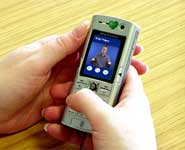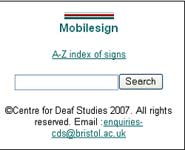Mobilesign.org is a video dictionary with over 5,000 British Sign Language signs. Produced by staff at the Centre for Deaf Studies, it is a mobile accessory to people who work with Deaf people, have Deaf customers or just want to learn to sign.
There is also help for parents with signs included that are specific to children like “Father Christmas”, “potty” and “naughty”.
The interface is extremely simple and is especially designed for mobile phone displays. Users either type in the word they want translated to sign or they choose from an alphabetic list. The signs do not appear until users ask for download, to avoid unnecessary charges for unwanted material. The signs can be played as often as users wish.
The service is provided completely free and users of Signstation, the Centre’s sign language resource web, will be alerted to the new service.
Jim Kyle, Harry Crook Professor of Deaf Studies at the Centre for Deaf Studies said: “This is a first step to providing support to hearing people’s communication with Deaf people – anywhere and at any time. From our research, we have identified this point of contact as a major issue for Deaf people in shops and daily life. The next step for us will be to construct a phrasebook in order that more extensive interaction can be supported.”
Chris John, Technical Director at the Centre, explained: “The need was for a very simple interface to allow easy access and to compress the video files so they would play well on mobile displays and at the same time be small enough to download with virtually no cost. We estimate that on most mobile phone contracts, downloading a sign will cost less than 1p.”
Linda Day, Sign Language Lecturer at the Centre, added: “Apart from the obvious use to access signs when you need to meet a Deaf person, it will be of great value to students of sign language and to parents – who just need that sign at that moment in time.”
To try out Mobile Sign, point your browser or set your mobile phone address page to www.mobilesign.org and type in a word or check the alphabetic listing. Users will need a mobile, on any networks, which has a video player or a 3G phone.
For more information on the development contact Chris John, Centre for Deaf Studies, University of Bristol, 8 Woodland Rd, Bristol BS8 1TN, email edxcj@bris.ac.uk or tel 0117 954 6900.

